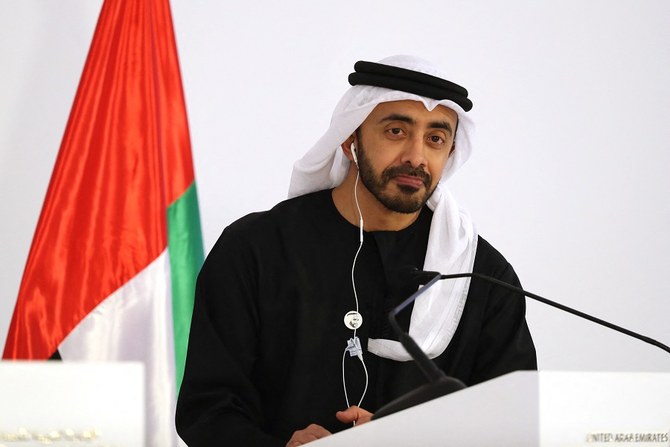DUBAI: The UAE Foreign Minister Abdullah bin Zayed Al-Nahyan has confirmed to the UN envoy for Libya the support of efforts made by the UN aimed at achieving unity in the country, Al-Arabiya TV reported.
Inter and Milan draw 1-1 in first leg of Italian Cup semifinals

MILAN: Inter Milan’s chances of a treble remain alive, as do AC Milan’s hopes of sneaking into Europe after the city rivals drew 1-1 in the first leg of their Italian Cup semifinal on Wednesday.
Hakan Çalhanoğlu thumped in the equalizer against his former club in the 67th minute after Milan forward Tammy Abraham had netted the opener less than two minutes into the second half.
Bologna beat Empoli 3-0 on Tuesday in the other semifinal. The return legs are scheduled for April 23-24.
Inter is on the hunt to repeat a treble haul of trophies it achieved in 2010 under Jose Mourinho. It has a three-point advantage over second-placed Napoli in Serie A — where it is the defending champion — and visits Bayern Munich on Tuesday in the first leg of their Champions League quarterfinal.
Milan has struggled of late and just two wins in its past six league matches has seen it slip to ninth in Serie A. Winning the Italian Cup guarantees a Europa League spot.
However, the Rossoneri took the lead right at the start of the second half. Inter midfielder Davide Frattesi tried to challenge Youssouf Fofana on the edge of the area but the ball came through to Abraham, who lived up to his reputation as a big game goalscorer with an angled strike into the bottom left corner.
But Çalhanoğlu levelled 20 minutes later with a powerful 20-yard effort that squirmed under Milan goalkeeper Mike Maignan.
Stuttgart beat Leipzig to reach German Cup final

- The victory continues Stuttgart’s rise since former Leipzig youth-team coach Sebastian Hoeness took over in April 2023
STUTTGART, Germany: Stuttgart set up a German Cup final clash with third-division Arminia Bielefeld after a 3-1 win over RB Leipzig on Wednesday.
Under the watchful eyes of Jurgen Klopp, the new head of global soccer for Leipzig’s owners Red Bull, the visitors were outclassed by a strong Stuttgart side.
Goals from Angelo Stiller, Nick Woltemade and Jamie Leweling took Stuttgart to victory, putting them on track for a first German Cup triumph since 1997.
The victory continues Stuttgart’s rise since former Leipzig youth-team coach Sebastian Hoeness took over in April 2023.
“We’re going to Berlin,” Hoeness told Germany’s ZDF.
“Unbelievable. The lads are unbelievable... it’s incredible. It’s a dream to travel to Berlin.
“We rewarded ourselves with goals at the right moment and when we needed to we defended with passion.”
The coach ended his post-match interview early before sprinting across the field to have his picture taken with the rest of the squad in front of the club’s ecstatic home fans.
Hoeness has become one of the most sought-after coaches in Europe, having led Stuttgart from relegation candidates to runners-up last season, and now the German Cup final.
The five-time German champions and three-time cup winners will be heavy favorites in Berlin in May, against a Bielefeld side who stunned holders Bayer Leverkusen on Tuesday.
Leipzig, winners of two of the past three German Cups, had a chaotic lead-up to the match.
On Sunday, the Saxons fired coach Marco Rose, who led them to the trophy two seasons ago, replacing him with interim boss Zsolt Low.
Klopp, a close friend of Rose who brought him to the club while coaching Mainz in 2002 but who signed off on Sunday’s decision, was spotted watching on from the stands on Wednesday.
Stiller put the hosts on track five minutes in, smacking home an unstoppable volley from outside the box to give Stuttgart the lead.
Leipzig were stunned but took control soon after. Visiting striker Lois Openda was kept at bay despite three clear chances between the 15 and 35-minute marks.
Woltemade doubled Stuttgart’s lead 12 minutes into the second half, sliding the ball under the goalkeeper after a clever one-two with Ermedin Demirovic.
Leipzig hit back almost immediately when Sesko hammered in with 62 minutes gone after beating the offside trap.
The visitors were in the ascendancy and an equalizer looked likely until Woltemade headed goalwards from a Stiller cross, with the ball bouncing to Leweling who tapped in from two yards out.
Three-time winners Stuttgart have not qualified for the final since 2013, when they lost to a treble-bound Bayern, and last won in 1997.
Founded in 2009 and promoted to the top flight for the first time in 2016, Leipzig had previously won four from four German Cup semifinals.
Libya ‘crackdown’ forces aid groups to cease operations: diplomats

- Libya has struggled to recover from the chaos that followed the 2011 NATO-backed uprising that overthrew longtime dictator Muammar Qaddafi
TUNIS: Diplomats in Libya have said in a letter to authorities seen by AFP that several international humanitarian organizations were forced to suspend operations after threats by security services and forced resignations.
In the letter, which was obtained by AFP on Wednesday, 17 mainly European ambassadors and a UN official accuse the Internal Security Agency (ISA) of an “ongoing crackdown” on non-governmental groups and humanitarian aid workers.
In war-torn Libya split between two rival administrations, the ISA reports to the interior ministry in the capital Tripoli, seat of the UN-recognized government.
“Between March 13 and 27, the ISA summoned at least 18 staff members from six international NGOs for questioning,” said the letter addressed to the Tripoli-based foreign ministry.
ISA agents “seized some of their passports,” forced them to “resign from their positions” and pledge in writing never to work for an international NGO again, the letter added.
It also said the security service “sealed some of their offices.”
Beyond the six groups directly affected, the diplomats said that “many other organizations are suspending activities as a matter of precaution.”
AFP was not able to independently verify the claims made in the letter, dated March 27.
The authorities in Tripoli did not immediately comment on the matter, but announced a press conference later on Wednesday to address “the work of international NGOs.”
Libya has struggled to recover from the chaos that followed the 2011 NATO-backed uprising that overthrew longtime dictator Muammar Qaddafi.
It remains split between the UN-recognized government in Tripoli and a rival authority in the east, backed by military strongman Khalifa Haftar.
The diplomats’ letter does not name the organizations affected by the ISA’s alleged measures, but a source familiar with the issue said on condition of anonymity that they include the International Rescue Committee, the International Medical Corps and the Danish Refugee Council.
Contacted by AFP, the Danish Refugee Council said it “could not comment” on the matter. There was no immediate comment from the other groups.
The source said that some foreign NGO staff members had been ordered to leave Libya, while others had been barred from returning after recent trips abroad.
The source mentioned that the authorities had already imposed visa restrictions on foreign humanitarian workers between July 2022 and December 2023, but operations had continued using local staff or individuals who did not require visas.
In their letter, the diplomats from the European Union, France, Britain and other countries as well as a top UN humanitarian representative voiced concern about the impact of the measures.
The crackdown including detention and questioning of staff members has had a “particularly alarming” effect “on the provision of humanitarian primary health assistance,” the letter said.
It urged authorities to allow the NGOs to “reopen their offices and safely restart humanitarian operations as soon as possible.”
It also demanded that seized passports be returned to staff members, and “any resignation letters or pledges signed at the ISA office” invalidated.
Will US pressure on Iraq succeed in bringing Iran-backed militias to heel?

- The Popular Mobilization Forces are formally part of Iraq’s state security apparatus, but include powerful militias loyal to Iran’s IRGC
- A long-debated Iraqi law aims to regulate the PMF, but critics argue it will do little to curb their ties to Iran or ease American pressure
LONDON: It was a message that was both unequivocal and uncompromising. Iraq must rein in the sprawling network of militia groups that take their orders from Iran, and if they threaten American interests in the country, the US will respond.
The comments were delivered last week by Tammy Bruce, the US State Department spokesperson, in response to a question on a new law being wrangled over in Iraq about the future of the Popular Mobilization Forces.
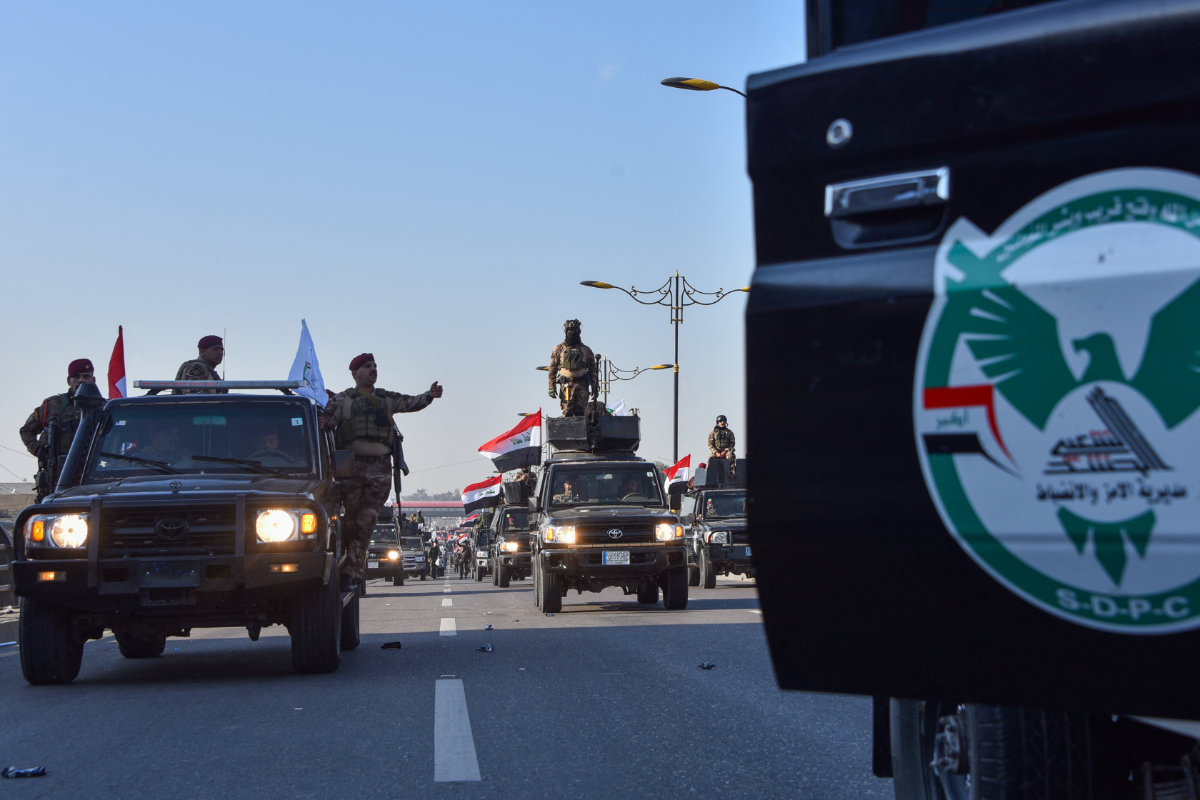
The PMF, an umbrella group for dozens of militias in Iraq, includes many that take their money and orders from Iran’s Islamic Revolutionary Guard Corps, despite belonging to Iraq’s formal state security apparatus.
Along with Hezbollah in Lebanon, the Houthis in Yemen, and Hamas in Gaza, they are considered part of Iran’s so-called “Axis of Resistance” — a network of proxy militias throughout the Middle East loyal to the IRGC.
America’s renewed military campaign against the Houthis, along with the degradation of Hamas and Hezbollah by Israel and the fall of Iranian ally Bashar Assad in Syria, has placed increased focus on Iraq’s Iran-backed militias.

They remain the only major Iranian proxy in the region to avoid significant Israeli or US military action since the Gaza conflict began in October 2023.
Doubts have been cast over whether the long-proposed Iraqi law to assert greater central government control over the militias would have much of an effect — or sufficiently appease US concerns.
But domestic events in Iraq, along with US President Donald Trump’s renewal of the “maximum pressure” campaign against Iran to suspend its nuclear program, place the PMF increasingly in the firing line.
There is a lot of pressure from the Trump administration on the government of Prime Minister Mohammed Shia Al-Sudani to rein in the Iran-backed militias, Renad Mansour, a senior Iraq research fellow at Chatham House, told Arab News. “Especially to stop any kind of attacks on American citizens or interests in Iraq.”
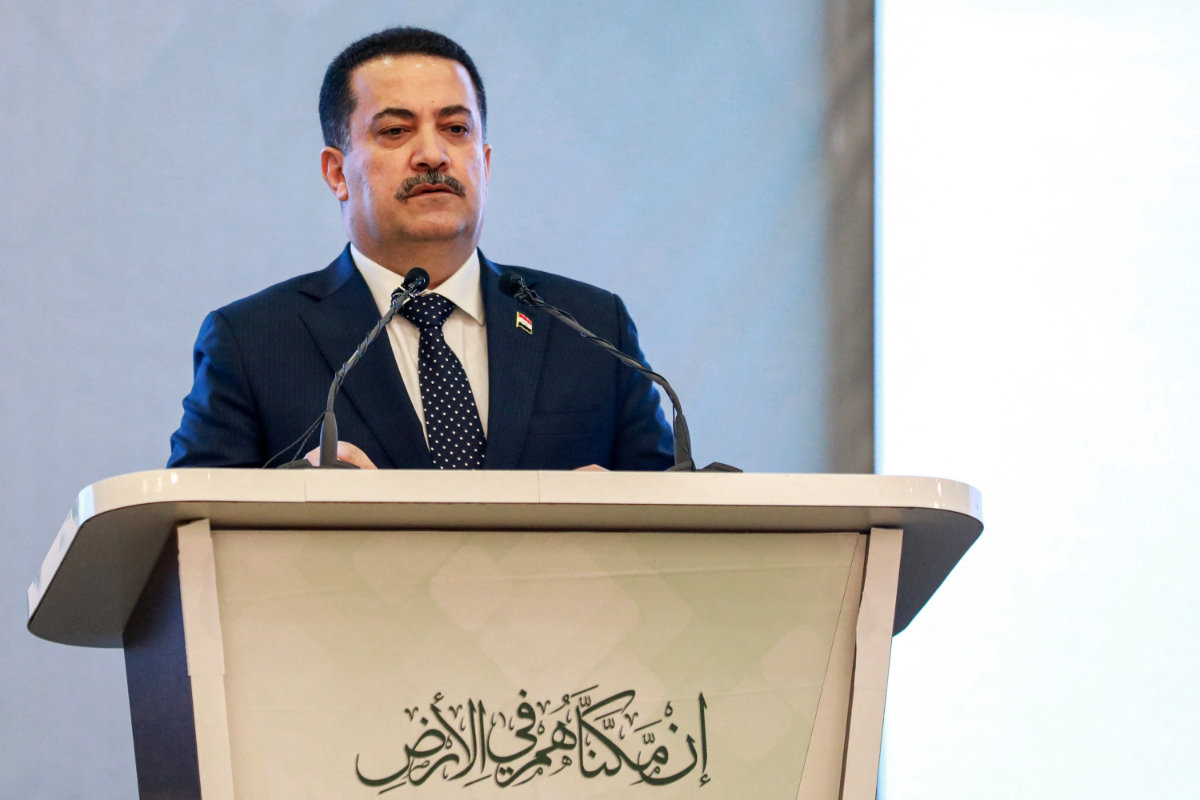
Mansour said the policy stemmed from renewed US efforts to combat Iranian influence in the region. “It’s very clear that the Trump administration is looking at Iraq as an important vehicle where Iran maintains economic and other types of authority,” he said.
The PMF, known in Arabic as Al-Hashd Al-Shaabi, was created in 2014 in response to a fatwa issued by the country’s top Shiite religious authority, Grand Ayatollah Ali Al-Sistani, after the extremist group Daesh seized swathes of territory.
The sprawling network of armed groups included many armed and funded by Iran. Many came from existing militias mobilized by the IRGC’s extraterritorial Quds Force.
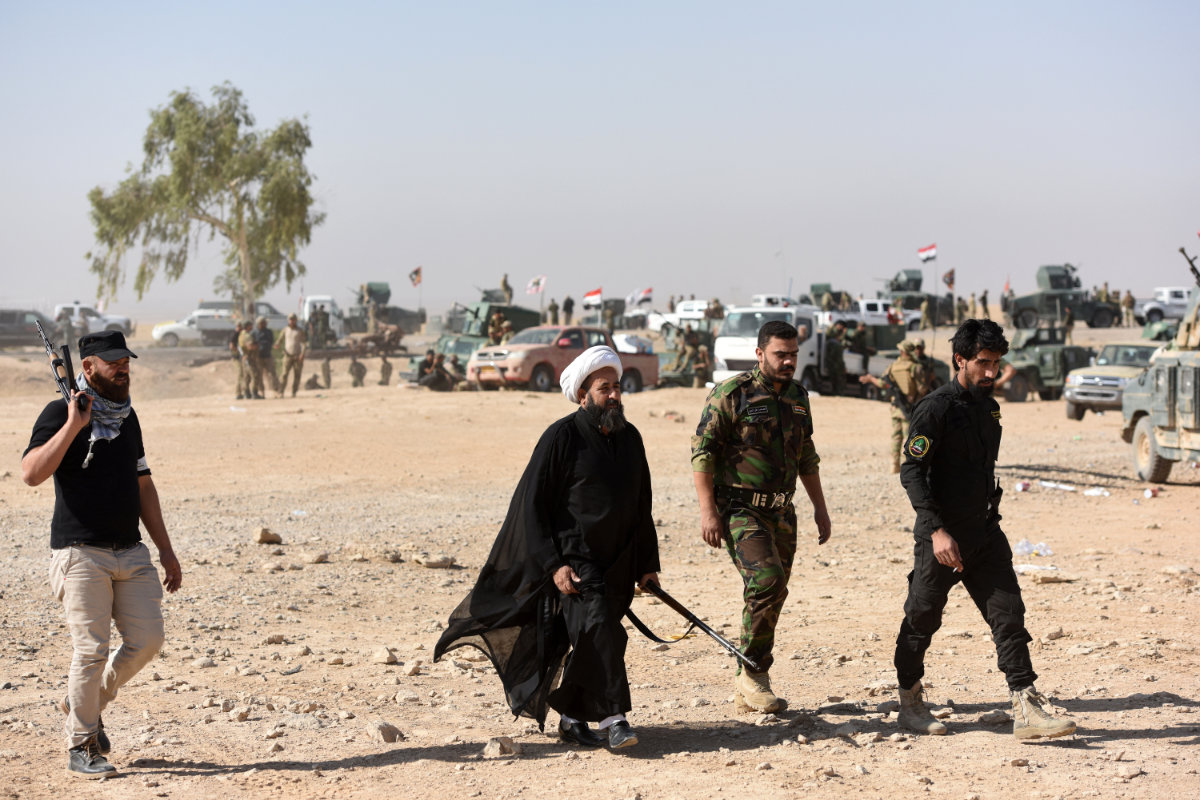
The PMF comprised approximately 70 predominantly Shiite armed groups made up of around 250,000 fighters. They played a major role in the defeat of Daesh in Iraq alongside the Iraqi Security Forces, Kurdish Peshmerga, and the US-led coalition.
After the extremist group was territorially defeated in Iraq in 2017 and attention turned to its holdouts in Syria, questions began to be raised over the purpose of the PMF.
A flimsy Iraqi law in 2016 attempted to exert more state control over the militias and included some basic details about their structure and employment terms.
IN NUMBERS
• 250k Fighters the PMF claims to have under arms.
• $3.3 billion Iraqi state funding at the PMF’s disposal.
Meanwhile, the PMF developed political wings that contested elections. These party blocs were accused by political rivals and Western governments of causing instability and acting in Iran’s interest.
The militias suffered a major blow in January 2020 when the first Trump administration killed PMF chief Abu Mahdi Al-Muhandis alongside Quds Force commander Qassem Soleimani in a drone strike near Baghdad airport.
Later that year, Al-Sistani, who had given the PMF its religious legitimacy when it was originally formed, withdrew his own factions as concerns over Iranian influence grew.
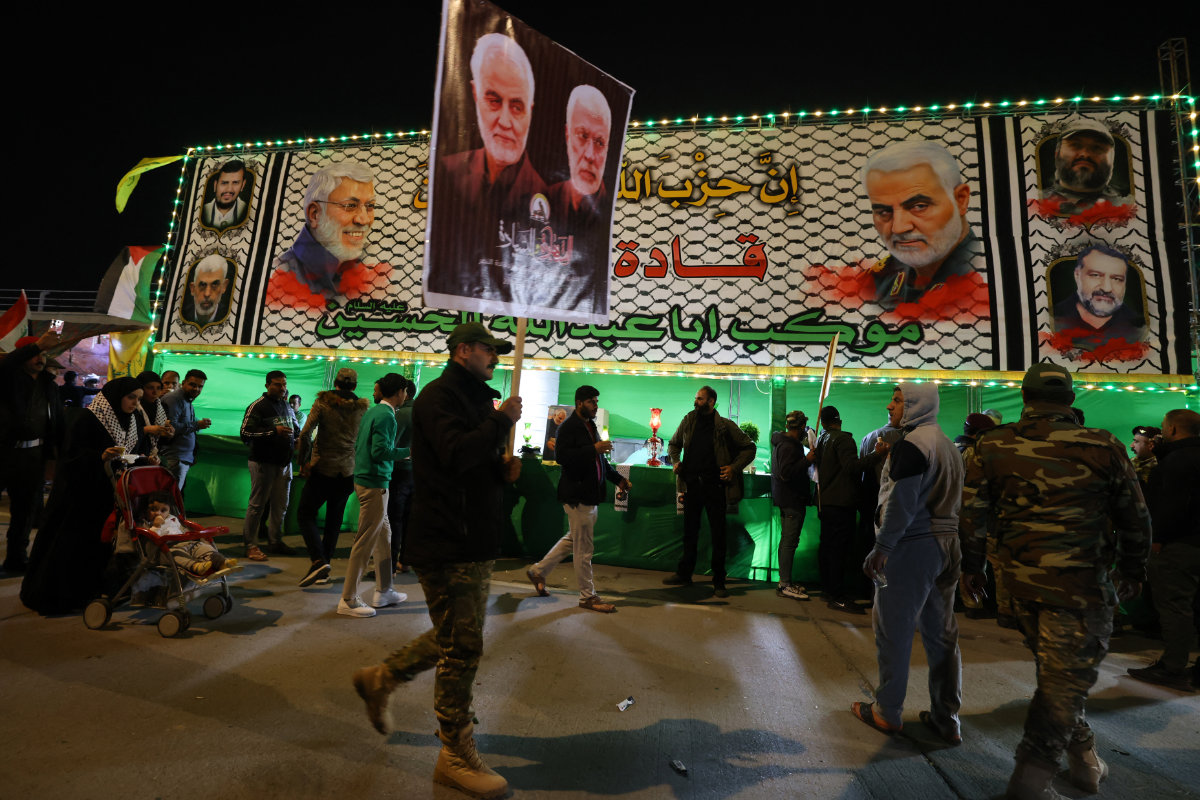
Yet the PMF managed to rebound from these setbacks, increasing both its funding and armory, including Iranian drones and missiles.
It has also been at the center of domestic turmoil, with its factions accused of an assassination attempt on then-Prime Minister Mustafa Al-Kadhimi in November 2021 and militias clashing with supporters of cleric Muqtada Al-Sadr in 2022.
After the Gaza war began in October 2023, the militias launched drones and missiles at Israel and carried out dozens of attacks on US bases in Iraq, where some 2,500 troops remain as part of the coalition mission against Daesh.
In February last year, the Biden administration bombed 85 militia targets in Iraq and Syria after three US soldiers were killed in a drone attack on a Jordanian outpost known as Tower 22.
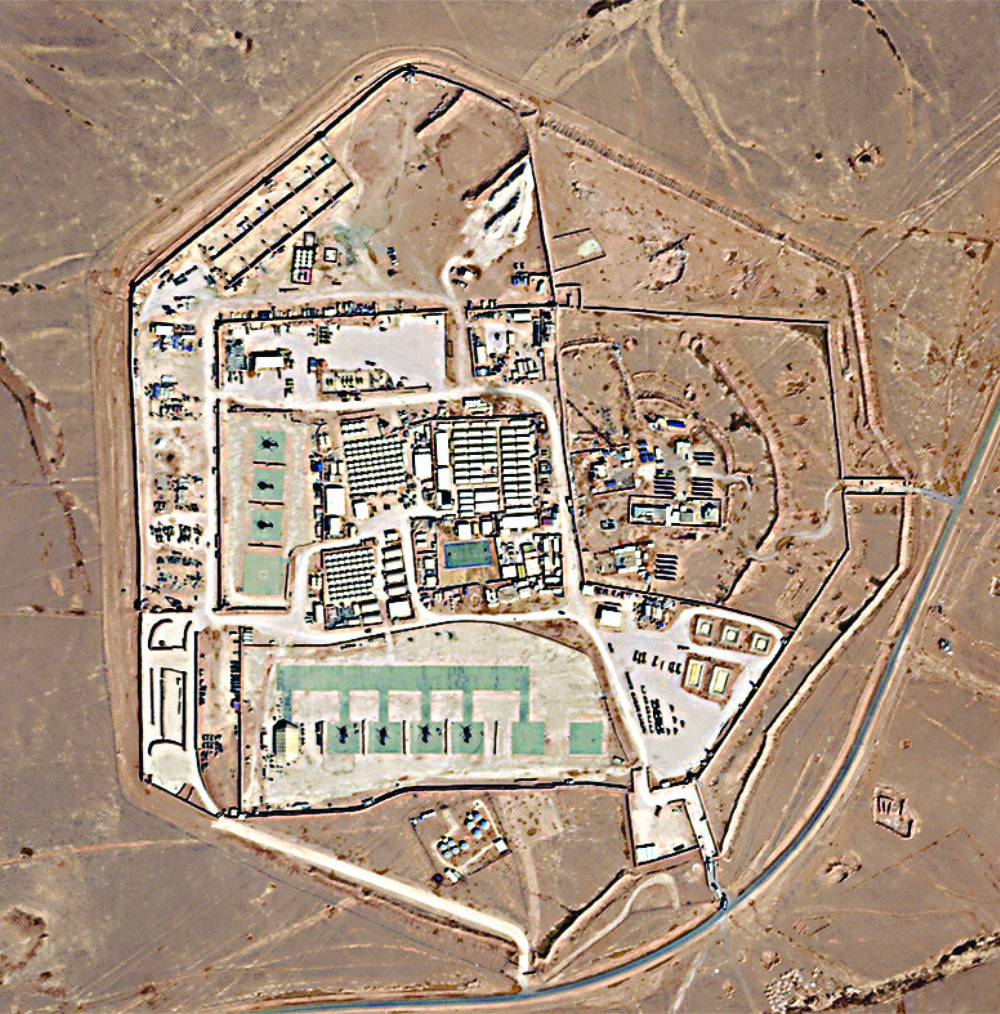
The US said senior commanders from the Kataib Hezbollah militia were among those killed. Since then, Iran has urged its militias in Iraq to refrain from attacking US interests.
“The Iraqi militias’ harassment of US targets in Iraq ended when the Biden administration took out three top commanders from the Kataib Hezbollah,” Hussain Abdul-Hussain, a research fellow at the Washington-based Foundation for Defense of Democracies, told Arab News.
“This signaled to militia leaders that their safety became at risk and their attacks stopped.”
The second Trump administration made clear in February when it issued the National Security Presidential Memorandum that Iraq’s militias would be central to renewed pressure on Iraq to reduce economic ties to Iran.
The other front is for Iraq to reduce dollar transactions with Tehran, particularly through cutting purchases of energy.
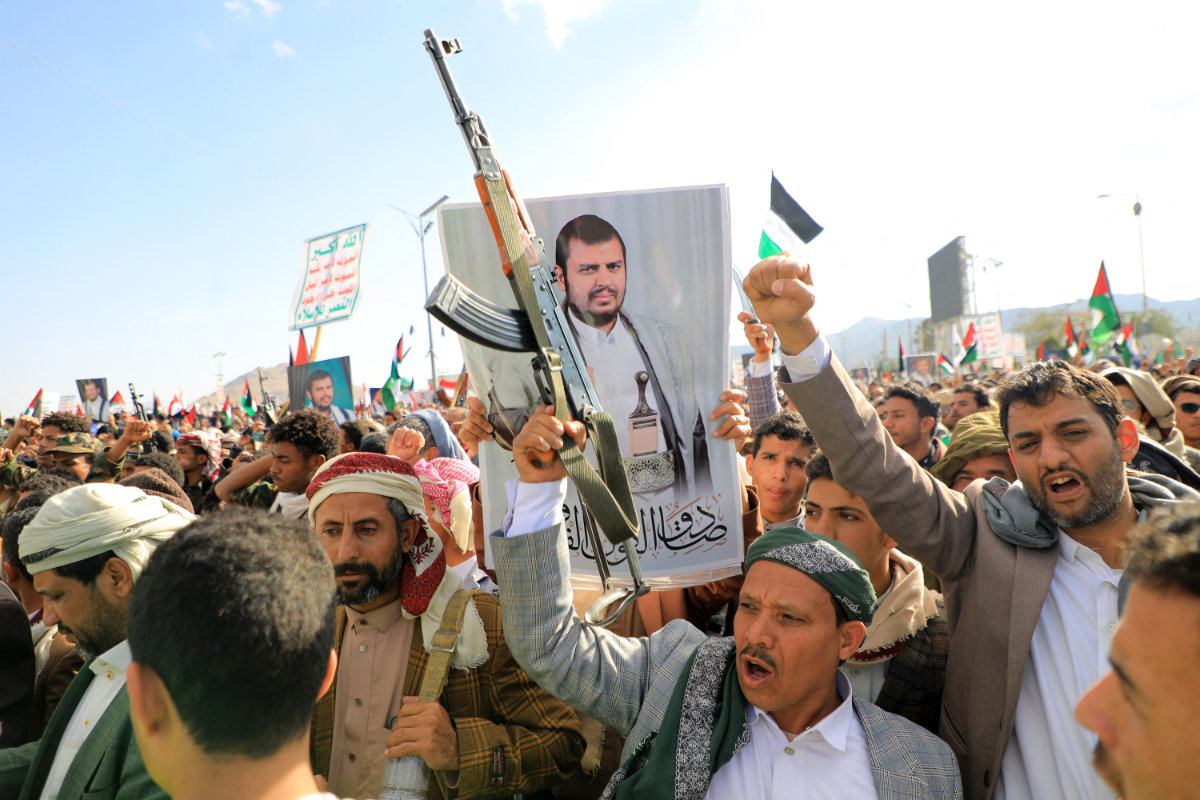
But there is also the wider geopolitical pressure on the militias as a result of US and Israeli attacks on Iran’s other proxies in the region, including Hamas, Hezbollah, and the Houthis.
“The Iraq militias became the last resort for all other Iranian militias across the region,” said Abdul-Hussain. “Since Israel crushed Hezbollah in Lebanon and Syria, the pro-Iran militia weight has shifted to Iraq.”
On the economic pressure now being exerted on Iran, he said the US is aware that the IRGC is siphoning US dollars from Iraq’s oil revenues, mainly using the $3.3 billion budget allocated to the PMF.
In response to this renewed pressure, the PMF Service and Retirement Law was introduced to the Iraqi parliament last week after months of wrangling over its contents.
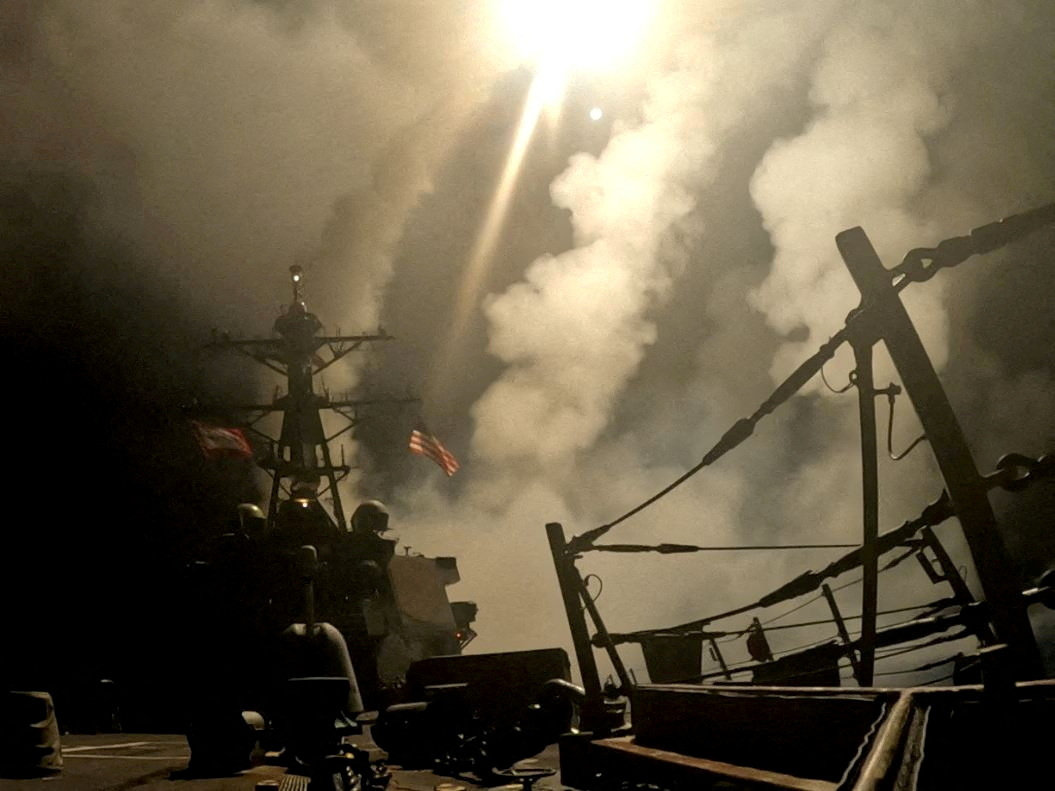
The bill aims to fully integrate the PMF into Iraq’s state security forces. However, critics say it has been hijacked by rival Shiite blocs jostling for advantage within the organization.
In its current form, the bill is unlikely to fill the US with confidence that the PMF will fully submit to central government control and renounce fealty to Iran. Abdul-Hussain described the bill as a “total smoke screen.”
He said: “Parliament is trying to enshrine PMF perks by law for fear that the next executive chief might not be Iran-friendly and could thus cut the $3.3 billion with a decree. Laws trump decrees, and that’s why the Iraqi parliament is racing to enshrine PMF funding in a law.
“The irony is that the same law does not demand that the organization follow a military order or be included under the military’s rank or supervision. They want to take the money but keep the hierarchy in the hands of the IRGC.”

Trump announces new ‘reciprocal’ tariffs in financial and political gamble

- Donald Trump: ‘I will sign a historic Executive Order instituting reciprocal tariffs on countries throughout the world’
- Trump: ‘Reciprocal that means: they do it to us, and we do it to them’
WASHINGTON: US President Donald Trump on Wednesday unveiled a raft of punishing tariffs targeting countries around the world including some of its closest trading partners, in a move that risks sparking a ruinous trade war.
Speaking in the White House Rose Garden against a backdrop of US flags, Trump slapped the most stinging tariffs on China and the European Union on what he called “Liberation Day.”
The dollar fell one percent against the euro and slipped against other major currencies as Trump was speaking.
“For decades, our country has been looted, pillaged, raped and plundered by nations near and far, both friend and foe alike,” Trump said.
Trump reserved some of the heaviest blows for what he called the “nations that treat us badly,” including 34 percent on goods from superpower rival China, 20 percent on key ally the European Union and 24 percent on Japan.
But the 78-year-old Republican — who held up a chart with a list of levies — said that he was “very kind” and so was only imposing half the amount that those countries taxed US exports.
For the rest, Trump said he would impose a “baseline” tariff of 10 percent, including Britain.
An audience of cabinet members, as well as workers in hard hats from industries including steel, oil and gas, whooped and cheered as Trump said the tariffs would “make America wealthy again.”
“This is Liberation Day,” Trump said, adding that it would “forever be remembered as the day American industry was reborn, the day America’s destiny was reclaimed.”
Sweeping auto tariffs of 25 percent that Trump announced last week are also due to take effect at 12:01 am (0401 GMT) Thursday.
Trump has telegraphed the move for weeks, insisting tariffs will keep the United States from being “ripped off” by other countries and spur a new “Golden Age” of American industry.
But many experts warn the tariffs risk triggering a recession at home as costs are passed on to US consumers, and a damaging trade war abroad.
The world has been on edge ahead of Trump’s announcement.
Markets have been volatile as investors hedged their bets, and the announcement came after Wall Street stocks closed.
The tariffs will also reinforce fears that Trump is backing even further away from US allies toward a new order based on a vision of American supremacy.
US trading partners have vowed swift retribution, while also trying to persuade Trump to reach deals to avoid tariffs in the first place.
Germany warned Wednesday that trade wars hurt “both sides.”
The European Union will react to new Trump tariffs “before the end of April,” said a French government spokeswoman.
The 27-nation bloc’s initial salvo would counter US actions on steel and aluminum, followed by sector-by-sector measures.
British Prime Minister Keir Starmer, who made intense, said a “trade war is in nobody’s interests.”
“We have prepared for all eventualities — and we will rule nothing out,” he told parliament.
Trump has had a long love affair with tariffs, insisting in the face of experts that they are a cure-all for America’s trade imbalances and economic ills.
The billionaire insists the levies will bring a “rebirth” of America’s hollowed-out manufacturing capacity, and says companies can avoid tariffs by moving to the United States.
But critics say US businesses and consumers could bear the burden if importers pass on the cost, adding that the policy could increase risks of a recession.
“If this trade war continues through Labor Day (on September 1), the US economy will likely suffer a recession this year,” Mark Zandi, chief economist of Moody’s Analytics, told AFP.
Negotiations are likely to continue though as countries seek to halt the tariffs.
Trump has previously been persuaded however to halt tariffs on neighbors Canada and Mexico while trade talks continued.
He ordered levies on both on the grounds that they had failed to stop the flow of the deadly opioid fentanyl into the United States.
“I understand that it’s a game of tug-of-war,” truck driver Alejandro Espinoza told AFP as he waited in a queue to cross the Mexican-US border.
“But unfortunately, we’re the ones who pay in the end.”


